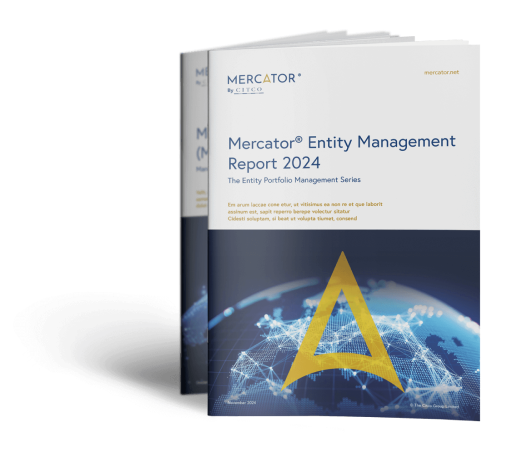The information contained in this document is marketing material and for informational purposes only. The information contained in this document is presented without any warranty or representation as to its accuracy or completeness and all implied representations or warranties of any kind are hereby disclaimed. Recipients of this document, whether clients or otherwise, should not act or refrain from acting on the basis of any information included in this document without seeking appropriate professional advice. The provision of the information contained in this document does not establish any express or implied duty or obligation between Citco and any recipient and neither Citco nor any of its shareholders, members, directors, principals or personnel shall be responsible or liable for results arising from the use or reliance of the information contained in this document including, without limitation, any loss (whether direct, indirect, in contract, tort or otherwise) arising from any decision made or action taken by any party in reliance upon the information contained in this document. © The Citco Group Limited, December 2024.
Q&A: Best practice for cross-border legal projects
Time, cost and scope – three things that can easily spiral when handling multi-jurisdictional legal projects. Mercator® by Citco (Mercator) speaks with Anthony Cavallaro, Global Counsel at Convera on how he ensures rigorous entity compliance and key lessons learned from managing lengthy cross-border projects.
What are the first steps to consider when kicking off cross-border projects?
Anthony Cavallaro: The first steps to any cross-border project should be setting timelines and budget and determining which stakeholders should be involved. This helps the project stay on course and ensures that the right people are involved from the very beginning. It is particularly important that the right stakeholders are chosen from the outset to help ensure that decisions can be made efficiently and the working group has the collective skills to be able to achieve the key milestones of the project on time and on budget.
What were your biggest challenges and what lessons did you learn?
AC: One of the biggest challenges has been keeping a strong momentum going for the duration of a lengthy cross-border project. There is often a lot of energy and dialogue at the start of a project while team members are involved in planning major goals and how to achieve them. However, as a project continues, there can be an almost inevitable lapse in enthusiasm and dialogue – especially where incompatible time zones are involved.
Two key lessons I’ve learned to counter this are: (1) set the right meeting cadences. Determine how regularly your group should meet and continue to re-assess this as the project continues. You might also want to consider alternating meeting times to accommodate less favourable time zones to give everyone an opportunity to bring their best selves to group meetings; and (2) celebrate the small wins – it’s important to break bigger goals into smaller ones and then celebrate the achievements of individual team members. Better yet, if you can ‘advertise’ the achievement by posting on your organisation’s intranet or sending a positive message to the team member’s manager, this goes a long way in keeping energy levels up.
What tools and actions helped you to maintain global oversight of the project and what are your expectations from your partners in such processes?
AC: It’s not ground-breaking but its importance can’t be overstated – create a tracker, maintain it and circulate it often. The tracker can be as simple as a table in an email that sets out the action items, individuals responsible and due dates. The simpler the better. This helps keep team members accountable and working towards goals. This also helps ensure that things don’t fall between the gaps working across various time zones. Once this system is in place, team members should be clear that they are expected to flag any issues with delivery early on for the benefit of the working group.
In your experience, did you encounter any tension between need for confidentially versus efficiency associated with the sharing of information? If so, how did you manage this?
AC: Where cross-border projects relate to disputes, there can be a tension between maintaining legal privilege over communications versus efficient sharing of information. In this situation, it’s important to choose members of the working group carefully. For example, you might want to consider limiting the working group to team members that are: (1) essential to managing the dispute; and (2) armed with the knowledge and authority to make decisions on behalf of their business function. This can help to protect legal privilege, avoid double-handling of information and allow for efficient decision-making.
What jurisdiction was the most challenging to navigate and why?
AC: From a corporate governance perspective, India can sometimes be a challenging jurisdiction given it is heavily regulated and very prescriptive in how it requires companies to fulfil its corporate obligations. Certain requirements are well intended to protect Indian consumers and maintain confidence in Indian corporate markets; however, might not sit well with modern global organisations – e.g. requirements around wet ink signatures, Board meeting procedures and tight deadlines for paying invoices to smaller suppliers can be difficult to fulfil yet carry significant penalties, up to and including imprisonment. The time investment to manage and fulfil these requirements can be significant.
To help manage this, it is important to allocate the necessary time, budget and resources for this jurisdiction from the outset… and if possible, engage Mercator® by Citco! In my experience, Mercator have a deep knowledge of Indian legal requirements and they have been an incredible help in navigating this jurisdiction.
Anthony Cavallaro
Global Counsel, Convera

